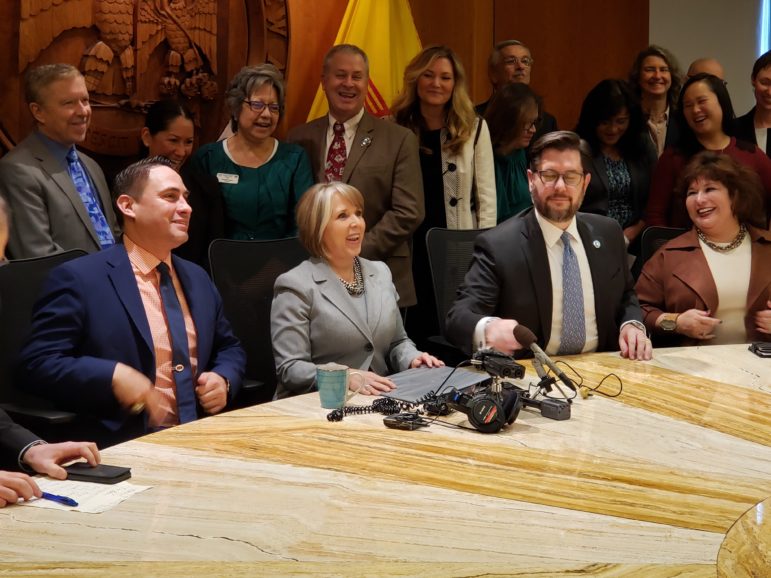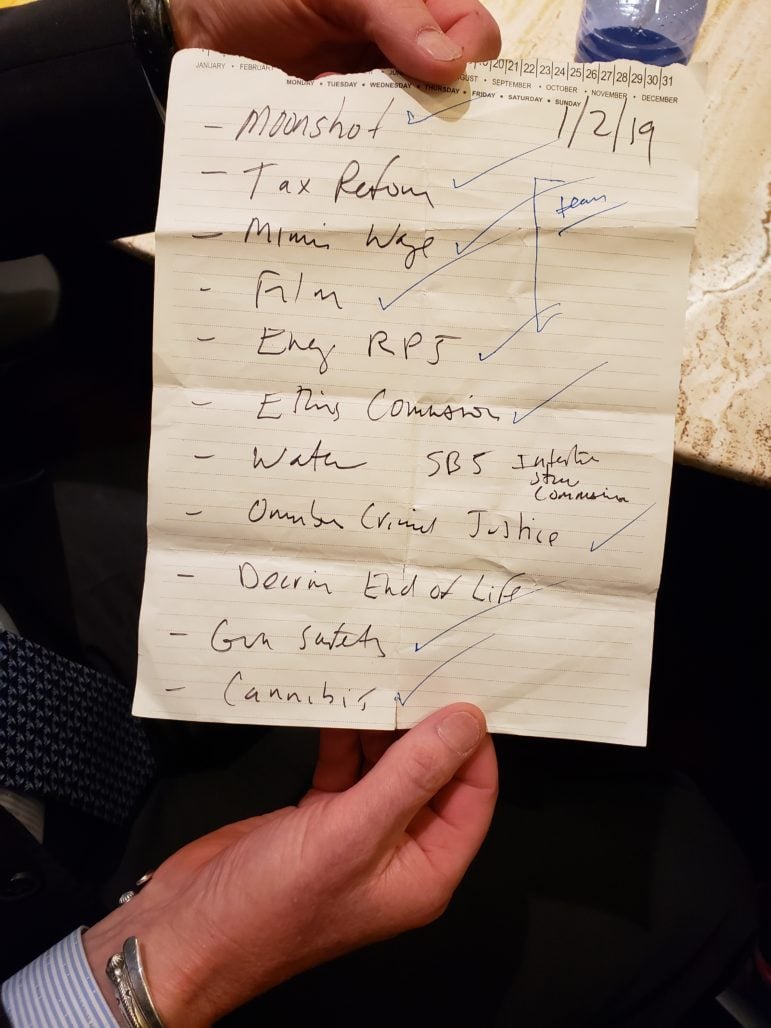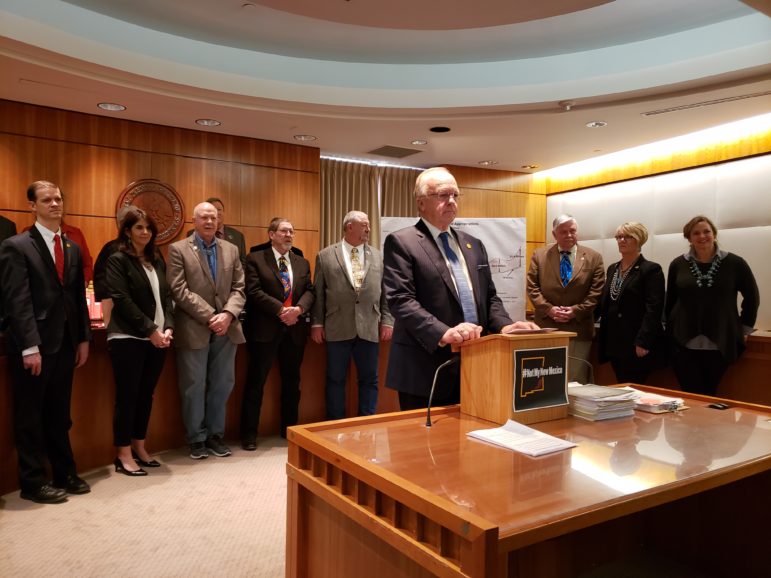
Gov. Michelle Lujan Grisham wrapped up her first session with the Legislature Saturday agreeing to the most significant increase in public school spending in decades and putting New Mexico in the hunt once again for leadership in the nation’s “green” movement.
A three-term congresswoman and former state cabinet secretary, Lujan Grisham began talking about a “moonshot” for education before she was sworn in as governor. No one expected a “moonshot” overnight, although to hear the governor Saturday, her first session behind her, she seemed ready for Mars.
“That is the best work of any legislature in the nation about making it very clear that we were going to get all of these ideas over the finish line,” a jubilant Lujan Grisham said.
The state routinely drags the bottom of national educational rankings, but the $7 billion state budget state lawmakers sent her is a first step in what state officials call a yearslong endeavor, proposing $500 million in additional spending for K-12 education.
The cash infusion is in response to last year’s historic education ruling that found New Mexico guilty of shirking its constitutional duty to adequately educate at-risk students.
As a result, every public school district will see flusher bottom lines. Teachers and school administrators will earn more money. And early childhood programs, long a goal for a coalition of advocates around the state, will get a boost.
And starting in July 2020, there will be a new Early Childhood Department. It will focus state resources on children from birth to 5 years of age, a long-sought goal by some. Scientific research shows children prepared for school do better later in life and state officials hope the department, coupled with other investments, will translate into more New Mexican children growing up into gainfully employed adults who don’t require government services.
After basking, the governor detoured from her normal boisterousness to sound a note of gravitas.
“We know it will take time, but we are dedicated to seeing those results through,” the governor said.
Longtime observers around the Roundhouse like to say every legislative session is different. But this 60-day session that just ended distinguished itself, perhaps because so much came together at once.
A new governor. The state flush with money following a decade of moribund revenues. And a more progressive House of Representatives powered by nearly two dozen energized freshmen. It was a concoction for change.
To hear Democratic leadership, it was the best session in decades, maybe ever.

“On Jan. 2, I made a list,” Senate Majority Leader Peter Wirth of Santa Fe said of the ambitious agenda the governor and the Legislature’s Democratic majorities pushed. “Moonshot, done. Tax reform, done. Minimum wage, done. Film, done. Energy, RPS, done.
Ethics Commission, done.”
House Speaker Brian Egolf, also of Santa Fe, one-upped the governor and Wirth, saying “This has been the best, most productive legislative session ever convened.”
Republican viewpoints were mixed.
In the Senate, Republican Minority Leader Stuart Ingle called it a “decent session.”
“Everything works well if you keep your communication open,” Ingle said. “…None of us are right all the time. Somewhere in the middle, there’s a decent place to be.”
In the House, Republican leaders, like the Democrats, gave in to the temptation of hyperbole; it just wasn’t positive.
“The session is over. And I think it will go down in history as the one time that the Legislature failed to listen to the populace,” said House Minority Leader James Townsend, R-Artesia.
House Minority Whip Rod Montoya, Republican of Farmington, spoke of a petition drive to try to repeal a gun measure that passed that he described as “radical gun taking.”
“This became a year of Santa Fe imposing their will on the rest of the state,” Montoya said. “This is government out of control. And I don’t think that the populace is going to be very happy about what the governor and the Democratic leadership are celebrating today.”

After eight years of former Republican Gov. Susana Martinez, the synergy between Lujan Grisham and the Democratic leadership was unmistakable, and hard to miss.
Lujan Grisham wanted more power to come from renewable sources like wind and solar, in effect a return to the 2000s when Democratic Gov. Bill Richardson pushed New Mexico to compete with California and other leaders in the national green movement. Under Martinez, that would have been dead on arrival. In 2019, the bigger the renewable plan, the better. The bill the Legislature sent Lujan Grisham would require 80 percent of the state’s power from large utilities to come from renewable energy sources by 2040, and be 100 percent carbon free by 2045. It makes New Mexico competitive with the most ambitious states transitioning to green power. Think California.
An independent ethics commission was breathed to life after more than a dozen years of debate by state lawmakers.
And those were just two of many of the session’s landmark accomplishments.
At some level, the session could be understood as pent-up progressive Democratic demand suddenly unleashed after eight years of Martinez standing in the way.
The Legislature on Saturday sent Lujan Grisham the first package of tax hikes in a decade. Martinez would never have let it get to her desk. The legislation will raise $70 million for the state’s general fund through a personal income tax rate hike for the state’s higher earners, taxing internet sales and raising the levy on what people pay when they purchase vehicles.
Ingle considered the Republican Senate caucus’ greatest accomplishment holding the line at $70 million and rebuffing the House’s much larger proposed increase. “When you have nearly $2 billion in excess revenue, the last thing we need to do is tax people,” he said.
There were other signals of a new mentality from the state’s chief executive. If Lujan Grisham signs the legislation as she is expected, low-income workers will see the state’s minimum wage rise to $12 an hour in 2022, up from $7.50. And for the first time since 2009 the state will have power to fine and assess fees under the New Mexico Oil and Gas Act.
Guns were in play, too. Near-universal background checks for gun purchases became law earlier this month. And Lujan Grisham is expected to sign other legislation that would make it a misdemeanor for people who have restraining orders to have a gun.
“On January 2, I made a list. Moonshot, done. Tax reform, done. Minimum wage, done. Film, done. Energy, RPS, done.”
Sen. Majority Leader Peter Wirth of Santa Fe on the ambitious agenda the governor and the Legislature’s Democratic majorities pushed.
New Mexicans also will be able to register the same day they want to vote and people will automatically be registered when getting their drivers’ licenses, two long-sought Democratic goals.
The Legislature also retooled one of Martinez’s signature achievements: the state two-tiered driver’s license system. A bill that makes it easier for undocumented workers to get drivers’ licenses cleared the Legislature and is awaiting Lujan Grisham’s signature.
Not all measures favored by progressive Democrats succeeded, most notably, their failure to muster the votes to eliminate a law that criminalizes abortion.
When it came to pulling back the curtain on how money is used to influence the political process, or how lawmakers decide what and what not to fund, there were victories and defeats.
State lawmakers passed a measure a decade in the making that will require more disclosure from those who make “independent expenditures” in political campaigns. Martinez vetoed a similar measure in 2017.
Another measure closed a loophole created by mistake a few years ago that exempted some lobbyist spending from public disclosure.
But the Senate defeated two other measures advocates say would open up to public view how politics works.
A proposal requiring lobbyists to disclose the bills they substantially work on during a legislative session was shut down.
And a bipartisan measure that would require lawmakers to make public how they divvy up their individual pots of infrastructure money–about $380 million this year– died on the Senate floor after mostly rural lawmakers convinced enough senators they had reason to fear such information becoming politicized when they run for reelection.
The governor, already thinking about the future, said Saturday she’d probably champion some of these measures in 2020 and in coming years.
Marjorie Childress and Elizabeth Miller contributed to this report.
More about the 2019 Legislative Session.